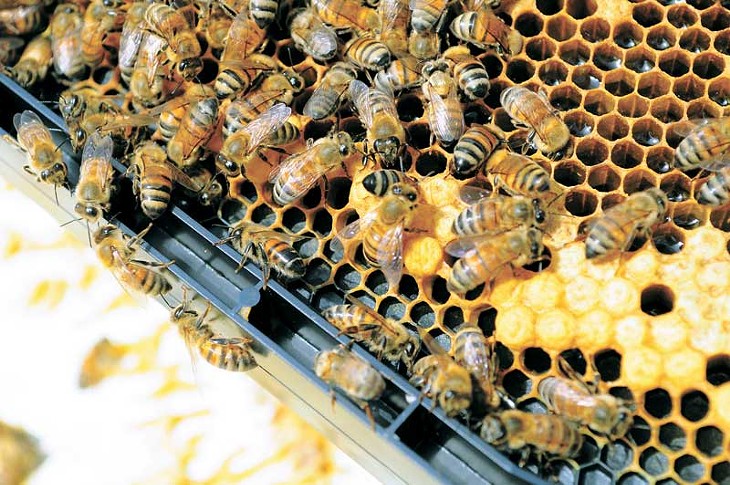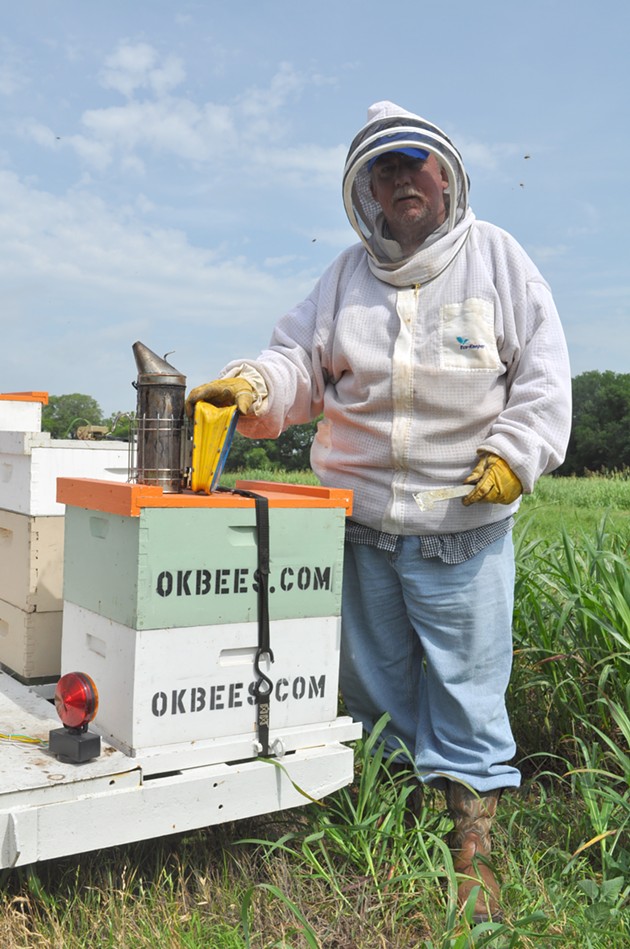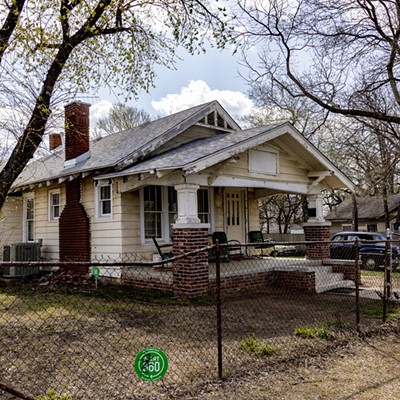Most of us take honey for granted.
We think of a person swathed in a beekeeping suit and hives that look like the illustrations in Winnie the Pooh. It turns out it’s a little more complicated, but you can keep bees in your tiny lot right here in the city.
Rick Hall is a beekeeper and a teacher of beekeeping. He runs a small company, OK Bees, offering honey, pollination services and bees for sale. He’s also the guy to talk with when you want to learn about bees and how to have your own. Hall teaches a beekeeping class that covers the basics needed to get started keeping bees. The class meets early in the year at Oklahoma State University — Oklahoma City (OSUOKC), 930 N. Portland Ave.
Hall started with a single hive and now manages about 100. He said that he was not only drawn to the appeal of honey and managing bees but there are several things going on in the bee world that concern him. Namely, there are several worrisome diseases affecting bee populations that piques his interest.
“It’s been said that bees are like the canary in the coal mine — whatever is affecting the bees will affect us,” Hall said.
He is particularly interested in colony collapse disorder, which causes the adults in a hive to leave, something against their basic nature. No one is quite sure why it happens, but local farmers, including Hall, think it might have to do with certain types of pesticides called neonicotinoids. They are chemically similar to nicotine and work on the nervous systems of most insects. While they are relatively harmless to mammals, which is appealing to farmers, they might have devastating affects on bees.
American honey bees are not a native species. They were brought over during the colonization of America by Europeans in the late 17th century. According to Rick Hall, we have a variety of nationalities, and they possess different innate characteristics.
“Italian bees are very docile. Russian bees tend to be more aggressive. A beginning beekeeper, I would sell you Italian bees because they are easier to work with,” said Hall.
There are also big differences in the temperaments of bees that have stationary hives versus ones that move around a lot.
“Wouldn’t you be a little more irritable if you had to pick up your house and move it every couple of weeks?” he said.
With his pollinating business, Hall takes his hives to different locations throughout the state to help farmers pollinate crops. This also benefits the bees, especially when pollinating canola because it is high in protein for the bees.
There’s a demand for honeys that the bees produce as a result of pollinating certain crops.
“When the black locusts bloom, we’ll find a grove of that and you’ll end up with black locust honey, and people know to look for that,” Hall said.
Hall was instrumental in getting Senate Bill 716 passed in 2013. The bill allows individual beekeepers to sell up to 6,000 pounds of honey annually without an inspection, which helps keep it a cottage industry, Hall said.
Kevin Gant is a local farmer and producer who is relatively new to beekeeping. He started out with Rick Hall’s course a few years ago and is no stranger to the fact that bees are delicate creatures. Before our recent winter was over, he lost one of his two hives.
Most beekeepers don’t harvest any honey the first year. This gives the bees a chance to build up their hive and reserves.
Since it was February when Gant lost his hive, he can wait on a swarm, when a portion of bees leaves a crowded hive, or wait until next year when he can stock up from bee sellers. When beekeepers purchase a nucleus – a “starter hive,” they buy about 3,000-5,000 bees. One of them is the all-important queen, who has been nurtured since she was a larva to perform her queenly duties.
In a swarm, when the hive is getting low on resources to support the number of bees in the hive, nurse bees, who take care of the larvae, start feeding a few of them royal jelly. The bee out of these select few that hatches first is instantly queen. And in her queenly duties, her first order of business is to destroy any competition. The existing queen leaves to find a new hive, leaving the “new” queen to her hive.
You can find out more about beekeeping classes at okbees.org. You can purchase fine local honey at a variety of places, including Urban Agrarian, 1235 SW Second St.; Buy For Less grocery stores; and through the Oklahoma Food Coop at oklahomafood.coop.
Print headline: Better than vinegar: Local beekeepers talk about the art and science of their craft












